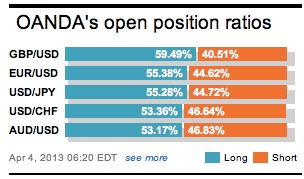Defending one sucker punch this week was never going to do it – softer US data yesterday honed in on a weakness in US employment forecasting. This morning it was activity in the Eurozone’s private sector falling at a sharper pace last month that has had a few nervous position holders already trigger happy ahead of the day’s main event. It’s CB-day or Central Bank meeting day and for a change it’s as much about the ECB and BoE as it was the BoJ last night.
Did the BoJ embark on its bold easing pledge to meet its +2% inflation target? Initial market thoughts and further Yen weak moves suggest that the BoJ’s commitment to adopt ‘monetary base control’ their way is a strong enough message to the marketplace that they mean business. Governor Kuroda pledged to achieve a +2% inflation target in about two-years, while taking additional easing actions, such as increasing their JGB holdings at an annual pace of +JPY50T, with JGB holdings to double in two years. They will also terminate their AP program, with assets purchases to be absorbed with JGB purchases, under its new easing scheme called “Quantitative and Qualitative Monetary Easing.”

For the ECB and BoE the expectations are for an unchanged decision on policy but it’s the Q&A with Draghi center stage that should be provide the market with all the fun. If noting else, Draghi can expect a grilling on Cyprus, the role the ECB played and why it did not prevent the initial move to hit insured depositors. He is sure to defend any flack on where the monetary union stands now. What about a banking union? Where does everyone stand? The market should not expect anything new to be offered. By day’s end, the ECB is doing its Central Bank job of providing liquidity and acting as a backstop through their OMT program.
The market should be concerned that the Tier I Central Banks are continuing to read from the same “QE song sheet.” This tune is only helping the riskier asset class – herding the market to embrace risk and reduce their exposure in the safety of cash and bonds. The aggressive expansion of Tier I Central Banks balance sheets has some Tier II policy makers (RBA and BoC) wondering if the bigger economies are relying more on “exporting their weakness” than in times past. Continued expansion of balance sheets will only further highlight overhanging currency war tensions.

The EUR and GBP have managed to go in opposite direction on the back of their own fundamentals this morning, just as the ‘mighty buck’ did yesterday. The dollar was under pressure from the US ADP and the ISN non-man employment sub-index disappointing the market. The private sector providers estimated they added only +151K jobs in March while employment sub-index weakened to 53.3 from 57.2 in February. The unsatisfactory headlines now has a few second guessing tomorrow’s non-farm payroll release.
The 17-member single currency was caught off-guard by the PMI services sector falling to 46.4 last month from 47.9. The Euro-zones composite PMI (manufacturing and services) fell to 46.5- completing nineteen consecutive months of contraction in the region. It was France (48) being the weakest of the major Euro-zone economies and Germany edging even closer to contraction (50.6) that has had the EUR bears smiling. There are no signs of an imminent recovery in the surveys – new orders are falling at a faster rate and the payrolls are being cut for a 15th consecutive month – which will only lead to higher Euro unemployment in the coming months (+12%). To date, the ECB has not been convinced that easing rates is the economic answer; they have been looking to politicians to press ahead with more fundamental economic reforms.

Cross the channel – the surprise comes from the UK this morning. The March service PMI came in at 52.4 much stronger than the 51.5 expected. The headline suggests that the U.K is likely to avoid a triple-dip recession with growth spluttering along at around +0.1/+0.2%. In reality, this is still too close to zero, suggesting that the UK economy is going nowhere fast. In the bigger picture, softer US data and weaker Euro-PMI’s should lead to a weaker outlook for the U.K and reason enough to suggest further monetary easing. However, this market seems to want to wait for the new Governor to take the reins in July before anything else is deployed.

What about the EUR? If it’s only more “hot” air we get from BoE and ECB then the ‘mighty buck’ could experience a short-term squeeze. The BoE is a supposed non-starter for any QE expansion and Draghi is to keep rates on hold, leaving Bernanke and company as the lone bond buyer and back to exporting the currency weakness. The others will eventually have to yield some of their pressures by easing – resulting in a stronger dollar. Until we hear from Draghi, any further intraday weakness for the EUR seems unlikely. Currently it’s the corporations, hedging for 1.2800 large expiries, who are buying the EUR dips.

Other Links:
EURO Tight With Options And Central Bank Decisions
This article is for general information purposes only. It is not investment advice or a solution to buy or sell securities. Opinions are the authors; not necessarily that of OANDA Corporation or any of its affiliates, subsidiaries, officers or directors. Leveraged trading is high risk and not suitable for all. You could lose all of your deposited funds.


